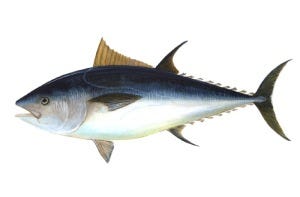Bye bye bluefin

The news about the bluefin tuna just keeps on coming. This week we had an exclusive story with some new predictions that the bluefin tuna population in the Med and the Northeast Atlantic is about to collapse. The only way of avoiding this with any certainty is a ban on fishing. However the current strategy for conserving the bluefin tuna involves more fishing and fishing that will cause the population to decline so precipitously that it would qualify as critically endangered.
As the story details, despite fine words about a ban at the IUCN meeting a month in October, the European Union, and the UK are heading to a crucial meeting held by ICCAT with a mandate that seems to do all it can to avoid actually mention moratorium. (See our piece and also this AFP report). While WWF is encouraged by signs in Italy and Spain of interest in a moratorium on bluefin tuna fishing, it is of course the EU/EC that has the seat at the table (which is one of the most important among the 46 nations involved in ICCAT).
The EC contends that it has done a good job on managing the bluefin through ICCAT, despite all evidence to the contrary. Matters are coming to head, though, at this November's meeting.
Underscoring this was a letter from ICCAT chairman Dr Fabio Hazin which was sent on October 31st to all the delegates. He writes, "I believe that this upcoming ICCAT meeting may very well be the most important one our Commission ever faced. ICCAT credibility is seriously at stake at this moment and our fate will be sealed ultimately by the decisions we make at Marrakech".
Every year, the politicians at ICCAT ignore the scientific advice. This year, there is more talk of heeding the scientific advice. But there is still plenty of wiggle room. A EC spokesperson said "there is not only one scientific advice". Within any estimate is a degree of uncertainty, and this can typically be exploited to allow for more fishing. One of the scientists who reworked the ICCAT data, said that some of the assumptions that had been made up in their models were incredibly optimistic.
In an interview, Andy Rosenberg, a fisheries scientist at the University of New Hampshire, also questioned the degree to which the scientific committee at ICCAT were truly independent. He says the scientists do a good job, but ultimately the committee is taking its "marching orders from the various members states. The science committee is asked to analyse various options."
He adds, "it really is up to governments and governments will respond to public pressure. But it is always too slow. Its a matter of people saying that this isn't acceptable. We need public outrage, this is the common heritage of mankind and an international resource and this is how we are dealing with it".
More soon on this. But for now I'll leave you with a few more of Dr Hazin's words.
"Let's not fool ourselves: there will be no future for ICCAT if we do not fully respect and abide by the scientific advice.... our credibility will be irreversibly jeopardized and the mandate to manage tuna stocks will surely be taken out of our hands. "
"...we must be aware that this is our very last chance to prove that we can do our job properly. if we fail, other institutions will take over. And if one stock falls out of our hands, others may well do likewise."
"please make every effort to ensure that your delegation will not miss such a crucial and historical moment for the Commission".
If nothing is done soon, the bluefin tuna will disappear from the MediterraneanOct 30th 2008



